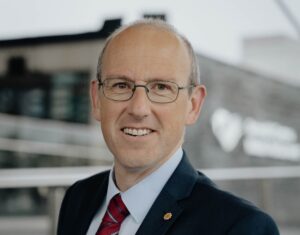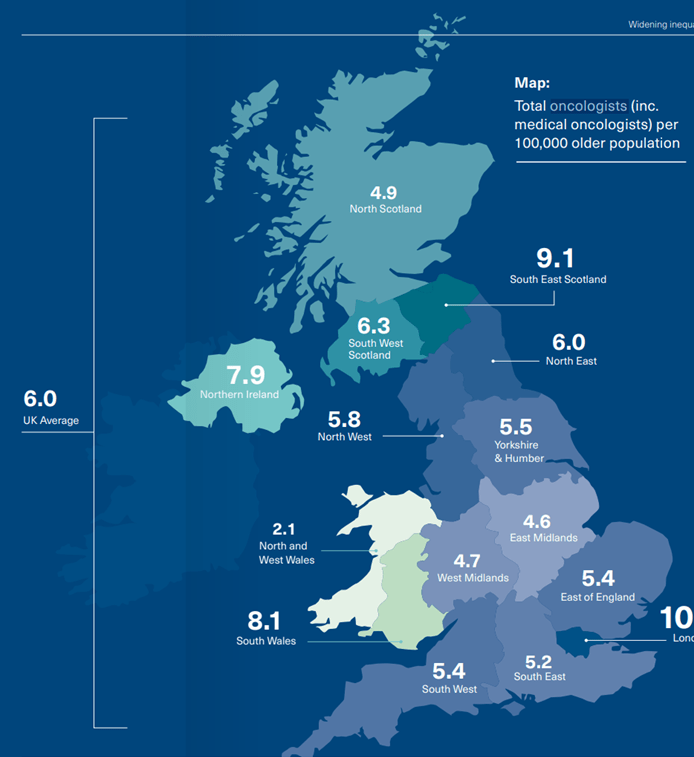North and West Wales have the lowest number of cancer doctors in the UK, stark new figures have shown.
Llyr Gruffydd, the MS for North Wales, has described the recently released figures outlined in the Royal College of Radiologists’ 2022 workforce census as “alarming”.
They show that in North and West Wales, there are just 2.1 oncologists (medical and clinical) per 100,000 older people. This compares with 8.1 in South Wales.
Across the whole of Wales, there are 5.5 oncologists per 100,000 older population – the lowest among the UK’s four nations.
Forecast retirement rates for oncologists are very high in Wales, with one in four (25%) expected to retire in the next five years. This rises to nearly one in two in the next ten years.
As a result, Wales’ workforce is projected to shrink over the next five years, with a negative growth of -1% a year.
Wales has an 11% vacancy rate, significantly higher than the national 7% average. Over 4 of 5 (80%) have been unfilled for more than 6 months.
Similarly, there are just 0.8 clinical oncologists per 100,000 older people in the area – compared to the UK and Wales average of 3.8.
A delay in the cancer outcomes means cancer patients are more likely to get very sick or even die. Every month of delayed cancer treatment raises the risk of death by 10%.

Mr Gruffydd, of Plaid Cymru, recently challenged First Minister Mark Drakeford on the issue on the floor of the Senedd.
Llyr Gruffydd MS said: “Last week, First Minister, the Royal College of Radiologists published its 2022 workforce census, with some damning results from a Welsh perspective.
“It revealed staggering discrepancies in the proportion of oncologists across the UK. London has over 10 oncologists per 100,000 population compared with north and west Wales with just over two per 100,000 people.
“More worryingly, there are also striking regional disparities within Wales itself. While the number of clinical oncologists in south Wales is 6.1 per 100,000 older people, it stands at a mere 0.8 per 100,000 older people in north and west Wales.
“The statistics on vacancy rates are equally alarming. Wales currently has an oncology vacancy rate of 11%, with 80% of these vacancies having remained unfilled for over six months.
“These trends are projected to leave Wales with a 41% shortfall in oncology staff within the next four years, the highest by far within all of the UK nations.
“We know that the Welsh Government has set a target for cancer diagnosis and treatment to be undertaken within 62 days for 80% of the population by 2026.
“It currently stands at just over a half. So, my question to you, First Minister, is how on earth do you expect to achieve this target in light of these of these alarming figures around oncology staffing levels in Wales?”
In response the First Minister claimed it would achieve its target through the “investment that we are making in the cancer workforce of the future.”
Following the debate in the Senedd, Llyr Gruffydd MS said: “We have a crisis in our NHS, with record breaking waiting times, longest ever ambulance response times, and a desperately depleted workforce. Labour have failed to tackle the crisis in our NHS, and it’s the patients and staff who are suffering.
“While Welsh Government insist there are ‘record numbers’ employed in the NHS in Wales, something clearly doesn’t add up, especially in oncology. It’s not just the vacancies in front line staff, it’s the time it takes to fill positions. If the current trend continues, the impact on patients in Wales will be devastating.
“Welsh Government has set ambitious targets for cancer diagnosis and treatment, but when they have missed their deadline for providing costings for their workforce plan, it calls into question how they hope to achieve this.”
Help keep news FREE for our readers
Supporting your local community newspaper/online news outlet is crucial now more than ever. If you believe in independent journalism, then consider making a valuable contribution by making a one-time or monthly donation. We operate in rural areas where providing unbiased news can be challenging. Read More About Supporting The West Wales Chronicle























